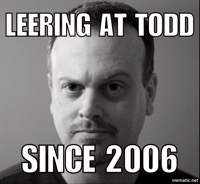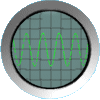 |
VO-BB - 20 YEARS OLD!
Established November 10, 2004
|
| View previous topic :: View next topic |
| Author |
Message |
cyclometh
King's Row

Joined: 06 Aug 2010
Posts: 1051
Location: Olympia, WA
|
 Posted: Fri Feb 18, 2011 8:41 pm Post subject: Levelling it out! Posted: Fri Feb 18, 2011 8:41 pm Post subject: Levelling it out! |
 |
|
OK, so I'm doing some recordings and I have a few questions about optimal levels for VO work. Also, I'm seeing some oddness with my software that may be simply a gap in my knowledge.
So I come to you lovely people.
Specifically:
* What is a "good" level for VO recordings? I currently tweak things so I peak about -6db, but I sometimes feel that it's too low.
* How much (if any) compression should I putting in the input chain? I tend to think "none" but I'm interested in opinions.
* What's a good level for the final track?
I guess what I'm curious about is what would a producer wanting to work with my voice tracks optimally expect for the levels, in order to make his or her job as easy as possible?
As to my software question, I use Cubase 5.5.2, and I notice a difference between playback and the final mix. If I playback in Cubase, it comes out at one level, but once I export a mixdown, it tends to be much quieter. Playing it back via the same interface, it seems to be about half the volume. I'd like it to export out as the same level as I play it back, although I may be missing something.
Thanks!
_________________
Corey "Vox Man" Snow
http://voxman.net |
|
| Back to top |
|
 |
georgethetech
The Gates of Troy

Joined: 18 Mar 2007
Posts: 1878
Location: Topanga, CA
|
 Posted: Fri Feb 18, 2011 11:55 pm Post subject: Posted: Fri Feb 18, 2011 11:55 pm Post subject: |
 |
|
I tell my clients to Normalize to -3db across the board for consistency. SaVoa says to do -6db. Others do -.2db (very close to max).
There's no standard... For auditions, make 'em hot, why not?
_________________
If it sounds good, it is good.
George Whittam
GeorgeThe.Tech
424-226-8528
VOBS.TV Co-host
TheProAudioSuite.com Co-host
TriBooth.com Co-founder |
|
| Back to top |
|
 |
Bruce
Boardmeister

Joined: 06 Jun 2005
Posts: 7980
Location: Portland, OR
|
 Posted: Sat Feb 19, 2011 8:51 am Post subject: Posted: Sat Feb 19, 2011 8:51 am Post subject: |
 |
|
This seems to be a once a year topic, but it's always good to review it. I send everything out where it burbles along at -6db or less with an occasional spike up to -3db and nobody's complained.
As far as compression and such, it all depends on who you're sending it to. If the audio is going to a professional engineer who's going to mix everything down, they prefer to get it as untouched as possible...they want to add their own effects. If it's going to an end user who isn't going to process it on their end then a small to a moderate amount of compression is usually helpful, enough to make it sound nice and professional. Just remember that if it's going onto radio or TV, the stations/networks already use a fair amount (or a LOT) of compression on their output, so adding a lot on your end could make it less than ideal.
For example, on dry tracks (without music) that are going to be used dry, such as medical narrations and audio books, I use enough compression to make them sound richer and to keep the softest words from disappearing, but nothing near rock 'n roll levels which could be annoying.
I use a tiny bit of gating to keep my hard drives from entering the picture (I really have to find a place to hide them) and to keep other small noises out too. Too much gating and the beginnings and ends of word can get cut off.
Others thoughts?
B
_________________
VO-BB Member #31 Enlisted June, 2005

I'm not a Zoo, but over the years I've played one on radio/TV. . |
|
| Back to top |
|
 |
SkinnyJohnny
Backstage Pass

Joined: 12 Aug 2007
Posts: 462
Location: Asheville, NC
|
 Posted: Sat Feb 19, 2011 11:50 am Post subject: Posted: Sat Feb 19, 2011 11:50 am Post subject: |
 |
|
I record down around -12 and bump up the levels with the software to around -3. If there are some stray peaks, I'll do a little hard limiting to knock those down.
I usually ask the client about levels, sampling rate etc.
_________________
John Weeks Voice Overs
www.johnweeksvoiceovers.com |
|
| Back to top |
|
 |
Jeffrey Kafer
Assistant Zookeeper

Joined: 09 Dec 2006
Posts: 4931
Location: Location, Location!
|
 Posted: Sat Feb 19, 2011 11:58 am Post subject: Posted: Sat Feb 19, 2011 11:58 am Post subject: |
 |
|
for Audiobooks I produce, I don't want any gating, limiting, EQ or compression. Just give me raw files that peak between -4 and -6 db.
_________________
Jeff
http://JeffreyKafer.com
Voice-overload Web comic: http://voice-overload.com |
|
| Back to top |
|
 |
Bruce
Boardmeister

Joined: 06 Jun 2005
Posts: 7980
Location: Portland, OR
|
 Posted: Sun Feb 20, 2011 9:43 am Post subject: Posted: Sun Feb 20, 2011 9:43 am Post subject: |
 |
|
| JeffreyKafer wrote: | | for Audiobooks I produce, I don't want any gating, limiting, EQ or compression. |
Ah, but do you process them at all when you release them? The majority of books I listen to sound slightly to moderately treated. Scott Brick sounds particularly compressed to me.
B
_________________
VO-BB Member #31 Enlisted June, 2005

I'm not a Zoo, but over the years I've played one on radio/TV. . |
|
| Back to top |
|
 |
Deirdre
Czarina Emeritus

Joined: 10 Nov 2004
Posts: 13026
Location: Camp Cooper
|
 Posted: Sun Feb 20, 2011 11:05 am Post subject: Posted: Sun Feb 20, 2011 11:05 am Post subject: |
 |
|
I allow peaks of -2.
For the most part I record hot at around -4.
_________________
DBCooperVO.com
IMDB |
|
| Back to top |
|
 |
Mike Sommer
A Hundred Dozen

Joined: 05 May 2008
Posts: 1222
Location: Boss Angeles
|
 Posted: Sun Feb 20, 2011 2:21 pm Post subject: Posted: Sun Feb 20, 2011 2:21 pm Post subject: |
 |
|
Let's understand that when recording into our DAW we are making, in essence a WAV or AIF file. When we covert such files to a "Lossy Compression File" such as an MP3, we loose a portion of the "digital audio information," and we also lose headroom. The digital information contained in audio files are nothing more than ones and zeroes, so everything gets cut across the board to reduce the file size, head room is apart of that information.
Let's consider that in the digital domain, 0 dBSF is the absolute dynamic limit that a digital recording can be made (anything louder than 0 dBFS is cut and not recorded). And let's understand that -6 dBFS is only 5dBFS away from 0dBSF.
So if we have made a full spectrum dynamic recording in our DAW, that is peaking at -6dBFS, and then bounce that file to an MP3, we can easily end up with only 2.5 to 2dB's of head room- which is perfectly fine. If you record with peaks that hit 0dBFS we start to run into problems.
We never ever want to record or normalize too near 0dBSF, this can introduce "intersample peaks." Instersample peaks occurs when the Digital Audio Converter (DAC) momentarily produces an analog signal the exceeds the digital signal. It's a rather strange anomaly to hear, it sounds like a very flabby analog distortion.
To put dBFS into persecutive its interesting to understand that there are no standardized reference from dBFS to dBVU or dBu. Digital and analogue are two completely different worlds.
Everyone seems to have made a guessing game out of equating how dBSF equate to the analogue world, here are just a few examples:
European & UK calibration for Post & Film is −18 dBFS = 0 VU
BBC spec: −18 dBFS =  M "4" = 0 dBu M "4" = 0 dBu
American Post: −20 dBFS = 0 VU = +4 dBu
Rock and / or Radio −16, or −14, or −12 dBFS = 0 VU = +4 dBu
So what are we to do?
Watch only your digital meters.
Maintain head room, don't think of the unused headroom as unconquered territory that must be filled. It is a buffer zone to insure good audio.
Try to keep peaking at -6 dBFS, if it goes over a little your fine.
If your find your levels are inconstant or peaky, include an outboard compressor to control the peaks (2:1 compression is just fine). It's better to fix the audio outside the digital domain, and such modest compression will not be noticed. But of course you can include a compressor in the DAW to even out the signal before you bounce.
The problem lies with the fact that we think louder is better. It is not in the digital domain. If you need it louder, turn up the volume at the speakers.
In the old days of analogue tape, we needed to record a little hot in order to get above the noise floor of the tape. Today we just need good clean audio.
_________________
The Blog:
http://voiceoveraudio.blogspot.com/
Acoustics are counter-intuitive. If one thing is certain about acoustics, it is that if anything seems obvious it is probably wrong. |
|
| Back to top |
|
 |
Chuck Davis
M&M

Joined: 02 Feb 2005
Posts: 2389
Location: Where I love to be...Between the Vineyards and the Cows.
|
 Posted: Mon Feb 21, 2011 4:31 am Post subject: Posted: Mon Feb 21, 2011 4:31 am Post subject: |
 |
|
That was an interesting post Mike, Thanks.
_________________
Wicked huge.....in India.
www.chuckdaviscreative.com |
|
| Back to top |
|
 |
cyclometh
King's Row

Joined: 06 Aug 2010
Posts: 1051
Location: Olympia, WA
|
 Posted: Mon Feb 21, 2011 9:00 am Post subject: Posted: Mon Feb 21, 2011 9:00 am Post subject: |
 |
|
Thank you very much for the detailed post, Mike. And to all, thank you for your help. I did some checking and after bouncing to an Mp3 and re-importing the file it comes back in with pretty much the same levels.
The issue appears to have been my perception of the sound, colored by a few factors. I also learned a bit about sound perception in humans and dynamic range that I didn't before (did some research on my own too).
Thanks again, all. Very helpful!
_________________
Corey "Vox Man" Snow
http://voxman.net |
|
| Back to top |
|
 |
Mike Sommer
A Hundred Dozen

Joined: 05 May 2008
Posts: 1222
Location: Boss Angeles
|
 Posted: Mon Feb 21, 2011 12:26 pm Post subject: Posted: Mon Feb 21, 2011 12:26 pm Post subject: |
 |
|
Corey,
When dealing with Lossy Compression like MP3, it depends on the size of the file you're starting with and how much digital compression you're adding. Since there can be many variables, your milage may vary.
Some DAW's (like Logic) will normalize by default when covering to MP3 to ensure headroom. It's good to understand that "Normalizing" works both ways it can reduce as well as increase peak volume. This is where a lot of problems began, with programs like iTunes, that would take dynamically packed CD's that were pushed to the absolute limit of the spectrum, and bumping them down to MP3's. The result was intersample peak distortion, or clipping, because there was no headroom in the CD and iTunes was not normalizing to insure headroom to the MP3 file-- and as far as I know still does not.
Even though we are dealing with just vocal tracts 99.44% of the time, we should still maintain headroom.
It's good idea not to get into the loudness war.
_________________
The Blog:
http://voiceoveraudio.blogspot.com/
Acoustics are counter-intuitive. If one thing is certain about acoustics, it is that if anything seems obvious it is probably wrong. |
|
| Back to top |
|
 |
cyclometh
King's Row

Joined: 06 Aug 2010
Posts: 1051
Location: Olympia, WA
|
 Posted: Mon Feb 21, 2011 12:32 pm Post subject: Posted: Mon Feb 21, 2011 12:32 pm Post subject: |
 |
|
I'm in total agreement, Mike. I'm actually pleased to hear what I am in this thread because honestly, I didn't like how my stuff sounded when I tried to make it louder.
I was just concerned a bit with how quiet it was compared to other tracks, but I'm not a pro mastering engineer, just a guy who wants to make the best raw voice tracks I can.
I know something I didn't before this discussion, which is always a good thing.  Thanks again. Thanks again.
_________________
Corey "Vox Man" Snow
http://voxman.net |
|
| Back to top |
|
 |
Jeffrey Kafer
Assistant Zookeeper

Joined: 09 Dec 2006
Posts: 4931
Location: Location, Location!
|
 Posted: Mon Feb 21, 2011 3:07 pm Post subject: Posted: Mon Feb 21, 2011 3:07 pm Post subject: |
 |
|
| Bruce wrote: | | Ah, but do you process them at all when you release them? The majority of books I listen to sound slightly to moderately treated. Scott Brick sounds particularly compressed to me. |
Yes, I limit at -6db to kill the volume spikes and then normalize to -3.5db. I may do it again if the narrator is particularly dynamic in volumes. This is so that the user doesn't have her eardrums blown out by a very quiet passage (in which she turns up her ipod) followed by a very loud one.
_________________
Jeff
http://JeffreyKafer.com
Voice-overload Web comic: http://voice-overload.com |
|
| Back to top |
|
 |
Bruce
Boardmeister

Joined: 06 Jun 2005
Posts: 7980
Location: Portland, OR
|
 Posted: Mon Feb 21, 2011 4:34 pm Post subject: Posted: Mon Feb 21, 2011 4:34 pm Post subject: |
 |
|
I must admit I'm rather amazed at the number of audiobooks that occasionally have dramatically different volumes from chapter to chapter, and these are from major publishing houses. Someone's not following standards there.
B
_________________
VO-BB Member #31 Enlisted June, 2005

I'm not a Zoo, but over the years I've played one on radio/TV. . |
|
| Back to top |
|
 |
cyclometh
King's Row

Joined: 06 Aug 2010
Posts: 1051
Location: Olympia, WA
|
 Posted: Mon Feb 21, 2011 5:07 pm Post subject: Posted: Mon Feb 21, 2011 5:07 pm Post subject: |
 |
|
Interesting point, Bruce. Is there a standard for it? Maybe it's my software background but I do sometimes wish there were independent standards specifications for some of this stuff.
_________________
Corey "Vox Man" Snow
http://voxman.net |
|
| Back to top |
|
 |
|
|
You cannot post new topics in this forum
You cannot reply to topics in this forum
You cannot edit your posts in this forum
You cannot delete your posts in this forum
You cannot vote in polls in this forum
|
Powered by phpBB © 2001, 2005 phpBB Group
|




 M "4" = 0 dBu
M "4" = 0 dBu
 Thanks again.
Thanks again.